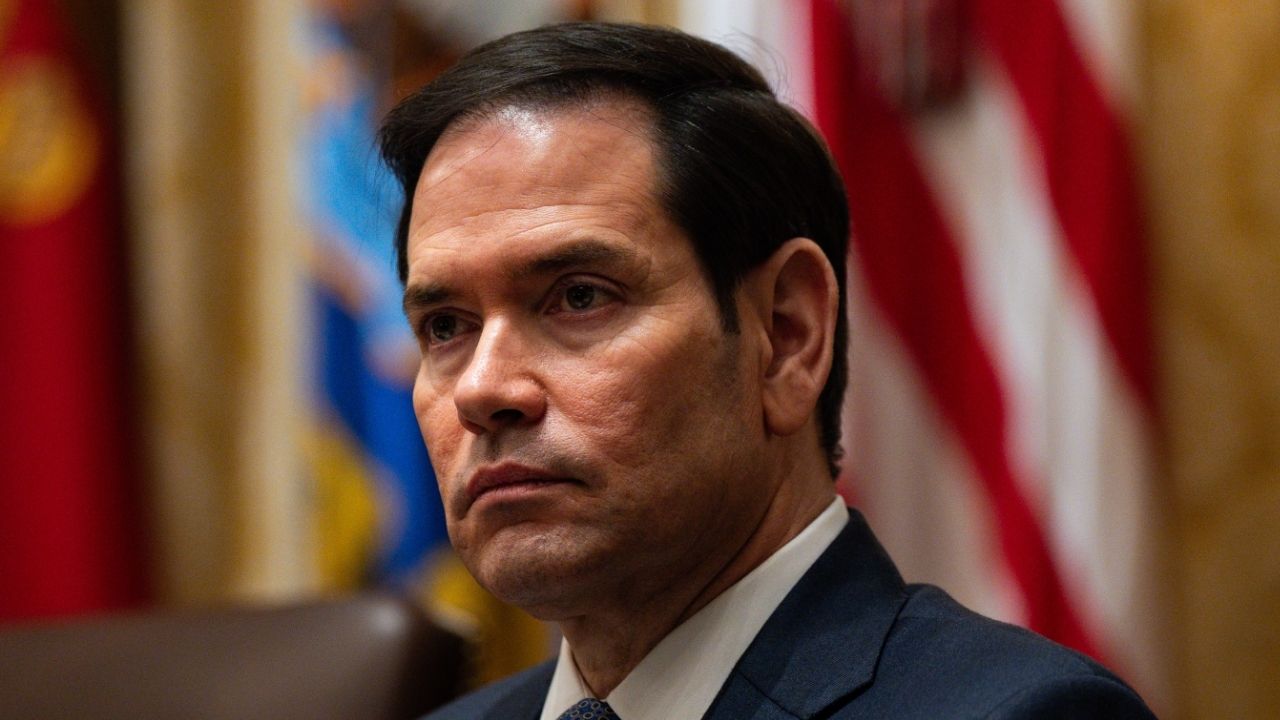Secretary of State Marco Rubio participates in a bilateral luncheon that President Donald Trump held for Prime Minister Viktor Orban of Hungary, in the Cabinet Room of the White House in Washington, Nov. 7, 2025. A Democratic senator has criticized Secretary of State Marco Rubio for paying $7.5 million to the government of Equatorial Guinea to agree to take deportees from the United States who are not its citizens. (Tierney L. Cross/The New York Times)
Share
|
Getting your Trinity Audio player ready...
|
WASHINGTON — A Democratic senator has criticized Secretary of State Marco Rubio for paying $7.5 million to the government of Equatorial Guinea to agree to take deportees from the United States who are not its citizens.
Sen. Jeanne Shaheen of New Hampshire, the top Democrat on the Senate Foreign Relations Committee, sent a letter to Rubio on Monday saying that the “highly unusual payment — to one of the most corrupt governments in the world — raises serious concerns over the responsible, transparent use of American taxpayer dollars.”
The $7.5 million is by far the largest payment the Trump administration is known to have made to another government to take deportees who are not its citizens.
Shaheen noted that Transparency International, a research group, ranked Equatorial Guinea 173 out of 180 countries for corruption. And the State Department itself said in its 2023 human rights report that the country’s “president and members of his inner circle continued to amass personal fortunes from the revenues associated with monopolies on all domestic commercial ventures” and that “corruption at all levels of government was a severe problem.”
A State Department report from 2025 on human trafficking pointed to multiple “credible sources” who had said government officials were involved in trafficking, including for sex.
“I have serious concerns over whether, without appropriate oversight mechanisms and guardrails, a direct payment to Equatorial Guinea’s government could be used to facilitate human trafficking,” Shaheen wrote. “I am also concerned about what protections are in place to ensure that third-country nationals removed to Equatorial Guinea are themselves not vulnerable to human trafficking, smuggling or human rights abuses.”
When asked about Shaheen’s statements, the State Department declined to comment on its arrangement with Equatorial Guinea, saying it did not want to reveal details of “diplomatic communications with other governments.”
“Implementing the Trump administration’s immigration policies is a top priority for the Department of State,” it said in a statement. “As Secretary Rubio has said, we remain unwavering in our commitment to end illegal and mass immigration and bolster America’s border security.”
In one of its most contentious policies, the Trump administration has aggressively tried to deport a wide range of immigrants from the United States. Rubio has ordered diplomats to try to forge agreements with other nations to take deportees who are not their citizens.
A New York Times investigation that was based mostly on reviews of U.S. diplomatic cables and other federal documents found that, as of June, American officials had approached at least 58 governments about this effort. Many of the nations that were asked to take deportees had records of persistent human rights abuses and torture. Equatorial Guinea was one of them.
The State Department has agreed to make large payments in some cases. It paid Rwanda $100,000 to take an Iraqi man and was discussing further arrangements with the country. Most notably, it agreed to pay El Salvador $4.76 million to take up to 300 deportees whom the Trump administration accused of being members of a Venezuelan gang, according to a court filing.
The men, at least some of whom had no clear ties to any gang, were put into a notorious prison. The Times found many suffered physical and mental abuse there.
In her letter, Shaheen noted that the $7.5 million payment to Equatorial Guinea was staggering compared with previous foreign assistance given to the country. Over the past two administrations, the most aid money the United States ever gave to the country was $2 million in a year. The most given in one year by the first Trump administration was $780,000. The current amount given exceeds the sum of the past eight years of payments.
And in previous years, the United States did not give the aid directly to the government, with the exception of limited medical supplies. It sent the assistance to vetted partners that included nongovernmental organizations and the United Nations.
The $7.5 million payment is from a fund set up by Congress for the U.S. government to help with migrant and refugee issues, and specifically to help resettle those in need.
The ruling family of Equatorial Guinea, a West African nation that has abundant oil and natural gas reserves, has been widely accused of corruption.
Teodoro Nguema Obiang Mangue, the son of the president and a vice president who is the expected successor, was convicted by a French court in 2017 of embezzling millions of dollars of public money that allowed him to lead a lavish lifestyle in Paris. The court imposed a suspended prison sentence of three years and a suspended fine of 30 million euros (about $35 million).
On Sept. 29, Christopher Landau, the deputy secretary of state, met with Obiang Mangue in Washington after the State Department had given him a waiver on corruption sanctions to travel to the United States during the annual United Nations General Assembly in New York. The State Department said the two officials “reaffirmed joint commitments to deepen commercial and economic ties, combat illegal immigration and advance security cooperation.”
—
This article originally appeared in The New York Times.
By Edward Wong/Tierney L. Cross
c. 2025 The New York Times Company
RELATED TOPICS:
Categories



















